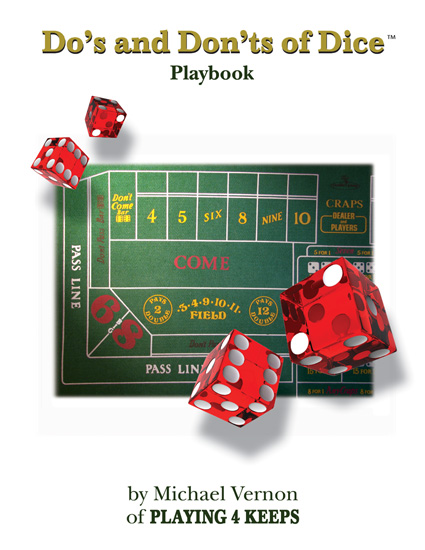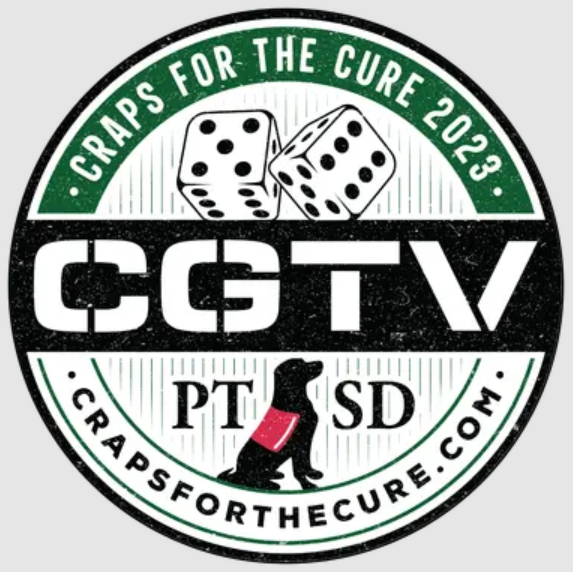|
|
 |
|
|
 |
|
|
 |
 |
|
The Real Battle You Face
We do our homework. Some of us painstakingly practice
our throws. We take pen to paper documenting to see if
our throws and betting methods will do well feeling that
if it worked out profitably well on paper, it will do
spectacularly well in a real casino playing environment.
Having put in the practice time, we know what we should
do, yet, for most players, when actually playing, doing
what we practiced is quite a different matter. As much
as many craps players like to talk about the fact that
they view the casino as their enemy and that their
preparation is akin to doing battle with their corporate
craps pit enemy, I have always felt that the real battle
each player faces is not with the casino, the battle
lies with the player, within him/herself. We know what
we should do in the casino. After all, we did put all
that monetary investment, preparation, and study into
our playing approach. Didn't we?
Again, every player who has put any time into studying
this game and how to master it knows what they should
do. Yet doing it in the casino is quite a different
matter. This is what discipline is all about. And it
goes hand in hand with money management. When preparing
to play, we should certainly consider the fact that what
you see and feel should also enter into your
preparation. Although, I could also make the argument
that outside of the mechanical throw, if we held our
discipline and did not allow extraneous influences to
govern our actions, with any good betting method, we
should do well over time in the casino, provided that
the variables are in place for you to employ your
approach and that you maintain good discipline.
The cold harsh reality for players to remember is that
there are so many extraneous influences impacting the
dice influencer outside of our practice environment and
not only that, we are dealing with the conversion of our
earned cash into what is energetically the casino's
chips. When actually playing the game, other players,
dealers and outside forces influence subconscious urges
and feelings in a our real playing environment and our
discipline can easily fly out the casino doors.
Here is a good example. In our Dice Busters workshops,
we teach and utilize betting approaches that capitalize
on capturing profit when the table is falling out of
probability. Our various betting approaches allow the
player to preserve their bankroll when the dice are
doing their usual thing. One of our approaches to
betting is a Pass Line parlay on the come out. While I
will not go into great detail here about the playing
method, suffice it to state that once a point is
established, the next step is to not place odds on the
pass line bet as a player awaits a decision. As a
result, the dealers will notice this. More times than
not, the friendly dealers encourage our student players
to take the "free odds" behind that pass line bet. Some
players succumb to the suggestion thinking that the
dealer must know something more than he or she knows. If
it wins, great, everyone is a hero. If it loses, the
player kicks himself for following outside advice and
not sticking to the plan and therefore giving up more
working capital than the betting approach called for.
That, in a nutshell, is discipline and money management.
Most players think they've got it made when they finally
find two or three systems, methods or approaches to
betting and winning in this game. This is not
necessarily so. This includes dice control. Some systems
do really well under the right playing circumstances and
at the very least you gain more profit when winning and
minimize losses when the playing environment just isn't
ripe, provided they maintain their discipline. What I
believe most smart players seek is a reliable approach
to playing craps that they can take to the casino and at
best, have the potential to win profit on a consistent
basis more times than when they lose. Remember, no
betting approach is fool proof. That's why they call it
"gambling."
In this game, discipline is essential. In the words of
our wonderful Dicecoach, "Play smart using discipline
and money management. Stick to your stop loss and stop
win and you will leave the games a winner!" He seems to
end every one of his written pieces with this sage
advice, for good reason.
With the above being stated, here are some general rules
I’ve worked on keeping that I will share with players.
This is strictly for even money wagering. If discipline
and money management seem to be an issue, until you can
figure out your own direction for risk aversion, stop
loss and stop wins:
- Always limit your losses to an amount you can afford
to lose and consider it working capital. Whatever it is
you lose, you have to get that feeling that "it is no
big deal" and not the "ouch, that hurt" feeling.
- For the non local players wishing to play a lengthy
four hour session, when figuring out what your profit
goal should be within a session, make it two to three
times what you would have considered an acceptable loss.
So, it would be about three times of what you considered
"no big deal."
- When winning and you have found that your original buy
in has doubled, consider increasing the size of your
initial betting unit by fifty percent. Should you
experience a losing trend, stop at what was fifty
percent of your profit. Go back to your base unit. Don't
chase.
Remember, as with anything challenging in life, the
toughest and most important battle you will face will be
the one you wage with yourself.
Soft Touch
|
 |
 |
 |
 |
|
 |
 |
Opportunities are often things you haven't noticed the first time around. - Catherine Deneuve - |
 |
|
|











